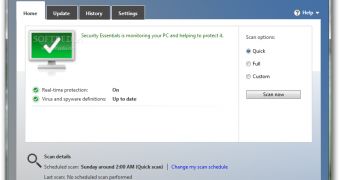Microsoft has aggressively promoted Security Essentials until not a long time ago, saying that it provides at least similar protection as any other anti-virus product, including rival software from Kaspersky, ESET, Symantec, or Bitdefender.
Holly Stewart, senior program manager of the Microsoft Malware Protection Center, admitted in an interview with Dennis Technology Labs, a company that performs anti-virus tests on a regular basis, that Security Essentials is indeed designed to remain “at the bottom” of all rankings, so users should really install third-party protection.
The surprising statements are actually supposed to show that Microsoft is trying to work with partners and security companies across the world as much as possible, with Security Essentials holding a key role in this collaboration.
The tech giant is keeping Security Essentials fully updated in order to provide the protection users need, so any other piece of software that achieves better results than this one is clearly capable of providing advanced security features.
"We had an epiphany a few years ago, back in 2011, where we realised we had a greater calling and that was to protect all Microsoft customers," Steward was quoted as saying by PC Pro. "But you can’t do that with a monoculture and you can’t do that with a malware-catching ecosystem that is not robust and diverse."
The Microsoft rep admitted, however, that Redmond previously invested a lot of money trying to make Security Essentials achieve better results in all these anti-virus tests.
"We used to have part of our team directed towards predicting test results and figuring out what might be in someone’s test. There’s always a cost to that," she said. "If they are doing that work they are not looking at those threats that are affecting our customers. We always felt that was wrong. There’s something not right about that – we’re not doing the best job for our customers."
Now it all comes down to the collaboration with partners that are supposed to provide better protection, even though Security Essentials doesn’t score well in anti-virus tests.
"We’re providing all of that data and information to our partners so they can do at least as well as we are," Stewart said. "The natural progression is that we will always be on the bottom of these tests. And honestly, if we are doing our job correctly, that’s what will happen."
Is this a way to explain Security Essentials’ recent poor performance in anti-virus tests? Maybe, but it’s pretty clear that Microsoft isn’t yet ready to develop a full-featured security product, so third-parties seem to remain your only choice for an unbreakable computer.

 14 DAY TRIAL //
14 DAY TRIAL //